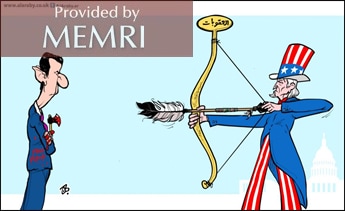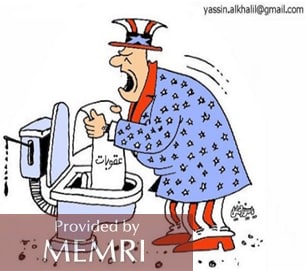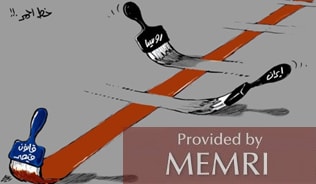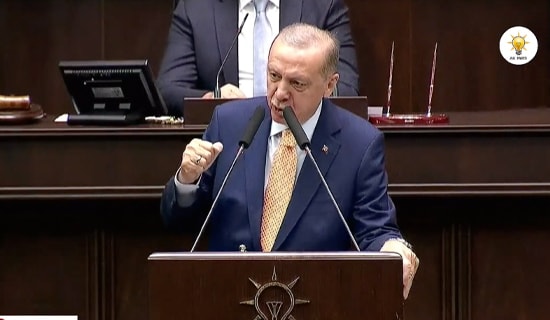Introduction
The Caesar Syria Civilian Protection Act of 2019, also known as the Caesar Act, which came into force on June 17, 2020, is U.S. legislation imposing sanctions on individuals and companies who finance the Syrian regime or conduct transactions with it, especially in the military and energy domains. Named after a former Syrian army photographer codenamed "Caesar" who smuggled tens of thousands of photographs out of the country documenting the torture and murder of prisoners in the regime's jails, the act also enables to sanction elements that extend construction or engineering services to the Syrian regime.[1] The act is meant to promote the goals of reaching a political solution to the Syria crisis consistent with UN Security Council Resolution 2254; holding war criminals to account; dismantling the Syrian regime's chemical weapons program and encouraging the regime to sever its relations with the Iranian militias.[2]
In the recent months, the Caesar Act has apparently had a tangible impact on Syria, diminishing the Assad regime's revenues and precipitating a severe energy crisis. Despite this, the regime is refusing to succumb to the pressure, and is trying to reassure the public in the areas under its control that the sanctions are less damaging than they seem. As part of this, President Bashar Al-Assad said on August 12, 2020 that "the [Act's] media effect is much larger than its actual consequences,"[3] and on June 23, 2020 then-Syrian foreign minister, Walid Al-Mu'allem, said, "We Syrians are accustomed to dealing with unilateral sanctions, which have been imposed on us since 1978 under various names."[4]
Moreover, since the Caesar Act came into force, the Assad regime has been acting to circumvent the sanctions and overcome their implications in two main ways:
-
Enlisting the help of its allies – chief of them Russia, Iran and Hizbullah – to guarantee the ongoing supply of goods and commodities to Syria by implementing joint economic agreements and by smuggling petroleum products into the country.
-
Filling the state coffers by imposing exorbitant fees on Syrian citizens living inside and outside the country and by seizing the assets of wealthy Syrian businessmen.
In this framework, regime officials have reiterated that thwarting and circumventing the sanctions is an interest and even a duty of the Syrian state, and also of its allies, who likewise suffer from the sanctions. For example, Assad's political and media advisor Buthaina Sha'ban said on June 22, 2020 that "thwarting these sanctions has become a national, regional and global duty of all the relevant parties who are adversely affected [by them]," and, in fact, "a duty of mankind as a whole."[5] On June 28, 2020, Syrian Foreign Minister Faisal Al-Miqdad, then serving as deputy foreign minister, said that Syria's neighbors are affected by the so-called Caesar Act no less than Syria itself, and that "it is a specific interest of the Arab states' peoples and leaderships to continue the political and economic coordination with Syria."[6]
For Iran, which is likewise under U.S. sanctions, helping the Syrian regime deal with the ramifications of the Caesar Act is part of its overall campaign against the international sanctions regime and the U.S. pressures. Accordingly, it is providing Syria with oil and economic aid; engaging in barter with it, to reduce both countries' foreign currency outlay, and acting to strengthen the military cooperation between them. Hizbullah, also under U.S. and international sanctions, helps smuggle fuel and goods to Syria from Lebanon.
In its struggle to overcome the U.S. sanctions, Syria also enjoys the backing of Russia, which regards its political, military and economic support of the Syrian regime as part of its bid to increase its international clout. Russia's aid to Syria is also motivated by economic considerations, such as involving Russian companies, especially in the energy sector, in the reconstruction of Syria, so as to increase Russia's economic presence in the Middle East.
It should be mentioned that, with the advent of Joe Biden's administration in the U.S., many wondered if he intended to change the U.S. policy on Syria, including by freezing the Caesar Act. In fact, in January 2021 it was reported that French President Emmanuel Macron was acting to persuade Biden to freeze the act due to its effect on the Lebanese economy, which France is trying to support, and so as to enable French companies to take part in the future rebuilding of Syria.[7] The U.S. administration later clarified that "no leniency will be shown in enforcing the Caesar Act."[8] Furthermore, on February 11, 2021, two members of the House of Representatives introduced a bill called the Bassam Barabandi Rewards for Justice Act, to grant monetary rewards for information on violators of the U.S. sanctions.[9]

Cartoon in Arab daily: The U.S. sanctions vs. the Assad regime (Al-Arabi Al-Jadid, London, December 25, 2020)
This report reviews the various ways in which the Assad regime and its allies are acting to circumvent and overcome the Caesar Act and its ramifications.
Russia Advancing Economic Agreements With Assad Regime To "Break The Siege On Syria"
Russia, one of the Syrian regime's major allies, declared from the start that the Caesar Act sanctions were illegal "economic terror," and clarified it would continue cooperating with Syria in a range of fields in order to break the siege on it. Russia's deputy foreign minister, Mikhail Bogdanov, said upon the Act's entry into force that "the diverse cooperation between our countries will continue and nobody can prevent this."[10] The Syrian regime, for its part, expressed its faith in the Russian assistance. Syria's ambassador to Russia, Riad Haddad, stated that the Caesar Act is aimed, inter alia, at Russian companies and elements cooperating with Syria, so "it is [only] natural that Russia should spearhead the struggle against these sanctions."[11] On another occasion he stated explicitly that, in every meeting between them, Russia and Syria discuss ways to circumvent these sanctions.[12]
On September 7, 2020, about two months after the Act came into force, a large Russian delegation headed by Deputy Prime Minister Yuri Borisov and Foreign Minister Sergei Lavrov visited Damascus. In meetings with Syrian President Assad and Prime Minister Hussein 'Arnous the two sides expressed a desire to reach new agreements that would limit the impact of the sanctions.[13] In a joint press conference with Lavrov and with then-Syrian foreign minister Walid Al-Mu'allem, Borisov said that the sides were considering a new agreement for expanding the economic and trade cooperation between them, to include over 40 new ventures, among them projects for rebuilding Syria's energy infrastructures and drilling for offshore oil. He explained that "Syria is facing a devastating siege by the U.S. administration and its European allies, and we are currently acting to break this siege."[14] An article by 'Awni Al-Homsi in the Syrian government daily Al-Thawra stated that the visit of the Russian delegation could be seen as "a declaration of war on the American economic sanctions," and that the Russians were committed to allocating billions to Syria's reconstruction.[15]
On November 9, 2020, Alexander Efimov, Russia's ambassador in Syria and Putin's special envoy for developing the relations with Syria, said that Russia was acting against the sanctions in various international forums, and that, "just as [Russia] supported Syria's steadfast struggle against the armed terrorists, it will not leave it alone in the fray against the economic terror."[16]
In an April 8, 2021 meeting between Assad and Russia's special envoy to Syria, Alexander Lavrentiev, both sides stressed that they would devote efforts to circumventing the sanctions and limiting their impact.[17]
In accordance with these statements, Russia is indeed advancing economic agreements and cooperation with the Assad regime, in a bid to help it weather the sanctions and their effects. Most of these agreements involve supplying wheat, oil and oil products to the Syrian regime.
In November 2020, Russian Ambassador in Damascus Efimov announced that Russia was providing Syria with wheat as aid and that about 100,000 tons of wheat had been supplied in the course of that year.[18] Hassan Suleiman, director of Syria's General Establishment for Cereal Processing and Trade in Tartus, reported on February 24, 2021 that two Russian grain vessels had arrived at Tartus port and that two more were scheduled to arrive at Latakia port, as part of a deal with a Russian company to export one million tons of wheat to Syria.[19] Syrian Ambassador to Russia Haddad said that imports from Russia would be long-term and meet the Syrians' monthly demand for staples, especially for wheat and oil products.[20]
Russia has indeed been aiding the Assad regime in the procurement of oil and its products. In November 12, 2020, representatives of Syria's Oil Ministry met with representatives of Russia's Industry and Trade Ministry and of a Russian investment company to discuss supplying the needs of the Syrian oil-production companies.[21] Syrian Transport Minister Zuheir Khazim said on December 29, 2020 that new agreements had been signed with Russia for the supply of energy,[22] and Syrian Oil Minister Bassam To'meh specified on February 3, 2021 that Syria has signed contracts with Russia for the import of 180,000 tons of petrol and a similar amount of fuel oil, meeting the country's needs until the end of June 2021.[23]
In addition, Russia has been advancing contracts with the Syrian regime for energy production in Syria's economic waters, which could yield profits for both sides. In February 2021 Oil Minister To'meh said that a new contract had been signed with a Russian company to drill for gas in the sea.[24] On March 16, 2021, it was reported that a contract had been signed with Russian company Capital Oil awarding it exclusive drilling rights in Bloc 1 off the coast of Tartus for 25 years, with option for renewal.[25]

Cartoon in Syrian government daily Teshreen: U.S. cries as it flushes its useless "sanctions" down the toilet (Teshreen, Syria, July 4, 2020)
Iran Provides Syria With Oil And Economic, Military Aid
Iran, the second major ally of the Syrian regime, announced when the Caesar Act came into force that it would continue cooperating with Syria and strengthening the economic ties between the two countries. Iranian Foreign Ministry Spokesperson Abbas Mousavi said that the sanctions were "inhuman" and a violation of international law.[26] On the day act came into force, on June 17, 2020, an Iranian delegation visited Damascus, headed by Hassan Danaeifar, first advisor to the Iranian President, who stressed in a meeting with Syrian Prime Minister 'Arnous that Iran stood with Syria in the fight against the economic sanctions. He added that the purpose of his visit was to extend economic aid to Syria.[27] Iranian Vice President Eshaq Jahangiri announced in a phone call with 'Arnous that the sanctions would only strengthen the relations between the two countries, especially their economic relations.[28] In addition, the Syrian head of the Iran-Syria Joint Chamber of Commerce, Fahd Darwish, said that the Syrians wished to learn from the Iranian experience in dealing with U.S. and Western sanctions.[29]
In practice, Iran is helping Syria to circumvent the sanctions and limit their impact in three main ways: by supplying it with oil; by conducting barter deals with it, rather than monetary transactions, to reduce foreign currency outlay, and by advancing investments and projects in energy, food and other areas. All this in addition to the military aid it extends to the Syrian regime.
Iranian Oil Tankers Keep On Coming To Syria
One of the main areas in which Iran is assisting Syria under the sanctions is oil and energy, particularly since Syria is undergoing a grave energy crisis in supplies of gasoline, natural gas and fuel oil causing severe energy blackouts in the country. Although Syria does have several oil fields, most of them are in the northeast of the country, which is under the control of the U.S.-supported Kurdish forces, and this compels the Syrian regime to import oil. Iranian Ambassador to Syria Javad Tarek Abadi said that Iran "is ready and willing to meet as much of Syria's petroleum and energy needs as it can. We and the Syrians are in the same boat at this historical [stage], and we are working hard to overcome the sanctions that the U.S. and its agents are trying to impose on us."[30]
In this context, there are often reports of Iranian oil tankers arriving in Syria, which is a clear violation of the sanctions on Syria and also on Iran, which is prohibited from exporting oil. For example, on October 1, 2020, a source in the Banias refinery on Syria's coast reported that an Iranian tanker had unloaded a million barrels of unrefined petroleum at the refinery,[31] and on October 18 the Syrian government daily Al-Ba'th reported that additional tankers with a million barrels of unrefined petroleum had arrived there and that previously two natural gas tankers had arrived.[32] The opposition Syria.tv claimed that these tankers were Iranian.[33] Likewise, on October 19, Al-Ba'th reported that an oil tanker had begun to unload 38,000 tons of gasoline at Banias port,[34] and Reuters reported that it was a shipment from Iran.[35]Additionally, on January 11, 2021, it was reported that an Iranian oil tanker had arrived at Banias port with two million barrels;[36] on April 7 a Syrian oil transport company source confirmed that an Iranian tanker with a million barrels had arrived in Syria,[37] and on April 11, Al-Ba'th reported that three more tankers had arrived.[38]
Furthermore, the Russian Sputnik agency reported, on April 17, that a Russian-Iranian-Syrian operations base had been set up to ensure fuel supplies to Syria, to include a Russian warship escort for Iranian tankers from the moment they enter the Mediterranean until they reach Syria.[39]
A source in the Syrian Oil Ministry enumerated measures taken by tankers in order to circumvent the sanctions and reach Syria, including turning off their automatic identification system, falsifying the numbers and statistics of their cargo, and arriving in Syria via long, circuitous routes.[40]
At the same time, not every oil shipment destined for Syria makes it. Syrian Prime Minister 'Arnous noted on January 17, 2021 that seven tankers bound for Syria had been stopped with "terroristic aggression" and that the most recent of these had been attacked in the Red Sea. He said that for over a month no tanker had been allowed near the Syrian coast.[41] Also, in March 2021, Syrian Oil Minister Bassam To'meh confirmed foreign media reports that Israel had attacked at least seven oil tankers bound for Syria.[42]
Syria-Iran Barter
An additional measure taken by Iran and Syria in an attempt to deal with the ramifications of the Caesar Act is engaging in barter, to reduce both countries' foreign currency outlay, since the act, as noted, bans doing business with the Syrian regime, and as a result prevents the flow of foreign currency into the state coffers. On July 20, 2020, it was reported that, at a meeting of the Syrian Ministry of Internal Trade and Consumer Protection and an Iranian trade delegation, it was agreed that the Iranians would supply Syria with goods and basic food commodities needed by the Syrian economy in exchange for Syria's exporting its agricultural surplus to Iran.[43] At another meeting between the two sides, on November 10, it was decided that bartering would begin in early December 2020.[44]
In this context, it should be noted that in February 2021, Keyvan Kashefi, the Iranian head of the Iran-Syria Joint Chamber of Commerce, announced that beginning March 10 a maritime transport line to bring goods between Iran and Syria would run once a month.[45]
Iranian Projects And Investments In Syria
The closer Syria-Iran economic relations are also evident in the advancement of large Iranian projects and investment in Syria in various areas. On June 8, 2020, a short time before the Caesar Act came into force, the Syrian parliament passed a law concerning the Syria-Iran contract for oil exploration and drilling in the Al-Bukamal region of eastern Syria. Former Syrian oil minister Ali Ghanem pointed out that the contract was for 30 years and that the profits from oil production would be split, with 25% going to Iran and 75% to Syria.[46] Likewise, Syrian Transport Minister Zuheir Khazim announced, on December 28, 2020, that an energy agreement had been signed with Iran,[47] and Syrian Prime Minister 'Arnous said, on January 17, 2021, that an agreement had been signed with Iran to build a power station in Latakia.[48] Also, on July 15, 2020, the director of Syria's General Establishment for Cereal Processing and Trade, Yousuf Qassem, announced that Iran had begun building three new flour mills in the Al-Raqqa, Deir Al-Zour, and Hasaka governorates, in addition to two mills whose construction was nearly complete.[49] That same month, in the Damascus free trade zone, an Iranian trade center named "Iraniyan" was opened, in which 24 Iranian transport, legal and banking, consulting, insurance and other companies operate with the aim of expanding exports from the Iranian private sector to Syria.[50]
In early December 2020, President Assad approved a line of credit agreement between the Export Development Bank of Iran and the Commercial Bank of Syria, under which the Iranian bank would facilitate $1 billion in funding for the Syrian bank.[51] Likewise, on the margins of the opening of Iran's House of Innovation and Technology Exports in the Damascus free trade zone, on March 3, 2021, the two countries signed a memorandum of understanding to encourage technological cooperation between them, as part of which the Iranian side would allocate a line a credit of $10 million to support the import of medical technological equipment to the Syrians.[52]
At the same time, from many statements by senior financial elements in Syria and Iran, it appears that trade between the two countries is minimal and has encountered difficulties. For example, the head of the Federation of Syrian Chambers of Commerce, Muhammad Al-Lahham, stated on December 14, 2020 that business between the two countries was very weak at that time, and that there were problems with the transfer of goods and funds.[53] Likewise, Iranian Mass Construction Association head Iraj Rahbar acknowledged that month that Iran had done nothing to rebuild Syria since 2018, and that none of the agreements between the two countries had been implemented.[54]
The Syria-Iran Military Agreement
Along with efforts to strengthen economic cooperation, Syria and Iran have also boosted their military relations, despite warnings from U.S. officials that a condition for lifting the Caesar Act sanctions was withdrawing all Iranian forces from Syria and severing relations with the Iranian regime.[55] Thus, on July 8, 2020, Syrian Defense Minister Ali Ayoub and Iranian Chief of Staff Mohammad Bagheri signed, during the latter's visit to Damascus, a comprehensive agreement for strengthening military cooperation between the two countries. Bagheri noted at the signing ceremony that Iran would strengthen Syria's air defense systems, and that the agreement "strengthens the desire and determination to cooperate in the face of the American pressure." Ayoub, for his part, clarified that "anyone betting on the destruction of Iran-Syria relations is deluding himself." He added that the relations between the two countries were strategic and stable, and that military and security cooperation between them was continuing and included all aspects despite the increase in the pressure and the threats.[56] Assad's political and media advisor Buthaina Sha'ban said that the Syria-Iran military agreement was the first measure taken by Syria to break the Caesar Act.[57]
The online daily Raialyoum.com reported that under the Syria-Iran agreement, Iran would equip Syria with its Bavar-373 and 3rd-Khordad air defense systems.[58] The Syrian opposition website Zamanalwsl.net stated that the agreement – which was claimed to be confirmation of previous understandings obtained in late June 2020 during meetings between Iranian and Syrian military officials in Tehran – included also the import of Iranian radar systems, listening and sensing stations, and the import of fuel for aircraft and other military uses.[59]

Russia and Iran erase the red line drawn by the Caesar Act (Source: Facebook.com/tomatocartoon, June 5, 2020)
SUPPORT OUR WORK

Hizbullah Helps Smuggle Fuel, Funds, And Goods From Lebanon Into Syria
Hizbullah in Lebanon, which supports President Assad and even fights alongside his forces in Syria, plays a significant role in helping the Syrian regime circumvent the Caesar Act. Hizbullah Secretary-General Hassan Nasrallah said on June 16, 2020 in reference to the Act that "Syria's allies, who have supported it politically and militarily, will not leave it alone it in the economic fray and will not let it fall… Those who sacrificed blood and martyrs so that Syria would remain united and would not succumb to the U.S. and Israel will not let Syria be defeated by the Caesar Act."[60]
Hizbullah aids the Syrian regime by helping to smuggle fuel and goods into Syria from Lebanon, which is itself experiencing a severe economic crisis. On October 7, 2020, the London-based daily Al-Quds Al-Arabi reported an increase in Hizbullah's smuggling of funds, fuel and other materials banned by the Caesar Act into Syria. According to the report, the organization had decided to establish a route for the transport of funds and food to the Syrian regime across the Lebanon-Syria border, which is under its influence, in order to ease the economic pressure on the Syrian regime.[61] According to an October 4, 2020 report on the Lebanese Janoubia.com website, which is opposed to Hizbullah, Syrian traders enter Lebanon under Hizbullah's protection to smuggle food, funds and goods back into Syria, as part of the organization's efforts to break the siege imposed by the Caesar Act.[62]
The Caesar Act Follow-up Team, established by the Syrian opposition, stated that it had provided the U.S. with detailed information on the network of roads and tunnels used by Hizbullah for its smuggling operations, including exact coordinates and names of key figures involved in this activity.[63]

Hizbullah turns Lebanon into money for the Syrian regime (Source: Al-Arab, London, July 1, 2020)
Reports indicate that the Lebanese authorities are making efforts to halt the smuggling operations. On July 6, 2020, for example, it was reported that the Lebanese army had detained eight people who were trying to smuggle goods to Syria;[64] on October 15, 2020 the Lebanese army thwarted an attempt to smuggle more than 20,000 liters of fuel into the country,[65]and on January 16, 2021 the army intercepted a vehicle smuggling fuel oil.[66] However, it seems that these efforts are only partly successful. For example, despite the decision of the Lebanese authorities to restrict the movement of fuel trucks in the area of the border with Syria to the daytime hours,[67] reports continue to appear about Syrian trucks smuggling fuel and goods across the border by night.[68] According to a January 14, 2021 report in the Lebanese Al-Akhbar daily, an average of 100 fuel trucks cross into Syria every day.[69] In early April 2021 it was reported that the smuggling of fuel from Lebanon to Syria continues, and that the Lebanese army does not always manage to stop it.[70]
Smuggling operations into Syria have occasionally been documented by Lebanese politicians. On December 30, 2020, the head of the Progressive Socialist Party, Walid Jumblatt, tweeted a video showing what he claimed were 50 trucks carrying fuel oil and food into Syria.[71] On January 14, 2021 Ziad Al-Hawat, an MP of the Lebanese Forces Party, likewise tweeted a video of a convoy of trucks, and claimed that "the smuggling continues."[72]

Walid Jumblatt's tweet
At the same time, there are also attempts to smuggle goods from various third countries into Syria via Lebanon. In early October 2020, the Saudi Al-Arabia TV network reported that the Lebanese authorities were investigating a vessel, the Jaguar S, which had arrived from Greece and entered Lebanon's territorial waters. It was carrying 2,750 tons of petrol purchased by the Syrian Al-Naem company, apparently in an attempt to smuggle the fuel into Syria in violation of the Caesar Act. Lebanese official sources assessed that the petrol was meant to be unloaded at Zahrani port in South Lebanon, a Hizbullah stronghold, and transported to Syria through illegal border crossings. The report also claimed that this was the second time this vessel had entered Lebanon's territorial waters in in half a year, and that the first time, it had been bound for Syria's Banias port.[73]
* O. Peri is a research fellow at MEMRI.
[1] State.gov, June 17, 2020; congress.gov, June 3, 2019.
[2] Al-Sharq Al-Awsat (London), June 17, 2020.
[3] Sana.sy, August 12, 2020.
[4] Sana.sy, June 23, 2020.
[5] Alwatanonline.com, June 22, 2020.
[6]Alwatanonline.com, June 28, 2020.
[7] In this context it was reported that Macron was behind a letters sent on January 21 by Christian politicians and clerics from Syria and around the world to President Biden and to the leaders of Europe, including to Macron himself, calling to revoke the American and European sanctions on Syria (Al-Arab, London, January 27, 2021; Al-Arabi Al-Jadid, London, February 2, 2021; enabbaladi.net, February 11, 2021). A French source later denied that Macron had anything to do with the letter or wanted the sanctions removed (enabbaladi.net, February 11, 2021). Concern in the Syrian opposition that Biden may heed this call prompted 47 Arab figures, Christian and otherwise, to send a letter to Biden and to Macron on February 10, 2021 urging them to increase the sanctions against the Syrian regime, stressing that the sanctions do not apply to food and medicines, so leaving them in place would not harm the Syrian people (twitter.com/aabnour, February 11, 2021).
[8] Al-Sharq Al-Awsat (London), February 4, 2021.
[9] The law is named after former Syrian diplomat Bassam Barabandi, who worked at the Syrian embassy in Washington and in 2013 defected from the Syrian regime and provided the U.S. with information about it. Al-Sharq Al-Awsat (London), February 14, 2021.
[10] Arabic.sputniknews.co, June 17, 2020.
[11] Al-Watan (Syria), July 12, 2020.
[12] Al-Watan (Syria), March 1, 2021.
[13] Sana.sy, September 7, 2020.
[14] Sana.sy, September 7, 2020.
[15] Al-Thawra (Syria), September 12, 2020.
[16] Alwatanoline.com, November 9, 2020.
[17] Sana.sy, April 8, 2021.
[18] Alwatanonline.com, November 9, 2020.
[19] Al-Ba'th (Syria), February 24, 2021.
[20] Al-Watan (Syria), March 1, 2021.
[21] Sana.sy, November 12, 2020.
[22] Al-Watan (Syria), December 29, 2020.
[23] Al-Watan (Syria), February 4, 2021.
[24] Al-Watan (Syria), February 4, 2021.
[25] Al-Thawra (Syria), March 16, 2021.
[26] Isna.ir, June 18, 2020.
[27] Sana.sy, June 17, 2020.
[28] Sana.sy, June 18, 2020.
[29] Tasnimnews.com, February 28, 2021.
[30] Arabic.sputniknews.co, July 15, 2020.
[31] Aliqtisadi.com, October 1, 2020.
[32] Al-Ba'th (Syria), October 18, 2020.
[33] Syria.tv, October 18, 2020.
[34] Al-Ba'th (Syria), October 19, 2020.
[35] Reuters.com, October 23, 2020.
[36] Syrianpc.com, January 12, 2021.
[37] Arabic.rt.com, April 7, 2021.
[38] Al-Ba'th (Syria), April 11, 2021.
[39] Arabic.sputniknews.co, April 17, 2021.
[40] Al-Akhbar (Lebanon), January 22, 2021.
[41] Al-Watan (Syria), January 18, 2021.
[42]Eqtsad.net, March 19, 2021.
[43] Al-Thawra (Syria), July 20, 2020.
[44] Al-Watan (Syria), November 10, 2020.
[45] Al-Sharq Al-Awsat (London), February 14, 2021.
[46] Al-Thawra (Syria), June 8, 2020.
[47] Al-Watan (Syria), December 29, 2020.
[48] Al-Watan (Syria), January 18, 2021.
[49] Al-Watan (Syria), July 15, 2020.
[50] Syria.news, October 18, 2020.
[51] Zamanalwsl.net, December 1, 2020.
[52] Alwatanonline.com, March 3, 2021
[53] Al-Watan (Syria), December 14, 2020.
[54] Mehrnews.com, December 27, 2020.
[55] Al-Sharq Al-Awsat (London), June 17, 2020.
[56] Al-Akhbar (Lebanon), July 9, 2020; Al-Thawra (Syria), July 8, 2020.
[57] Almasirah.net, July 10, 2020.
[58] Raialyoum.com, July 9, 2020.
[59] Zamanalwsl.net, July 27, 2020.
[60] Almanar.com.lb, July 16, 2020.
[61] Al-Quds Al-Arabi (London), October 7, 2020.
[62] Janoubia.com, October 4, 2020.
[63] Almodon.com, October 10, 2020.
[64] Nidaalwatan.com, July 6, 2020.
[65] Al-Joumhouria.com, October 15, 2020.
[66] Al-Joumhouria.com, January 17, 2021.
[67] Al-Sharq Al-Awsat (London), October 3, 2020.
[68] Al-Quds Al-Arabi (London), October 25, 2020; Al-Akhbar (Lebanon), January 14, 2021.
[69] Al-Akhbar (Lebanon), January 14, 2021.
[70] Almodon.com, April 6, 2021; aljoumhouria.com, April 7, 2021; Al-Sharq Al-Awsat (London), April 8, 2021.
[71] Twitter.com/walidjoumblatt, December 30, 2020.
[72] Twitter.com/ziad_hawat, January 14, 2021.
[73] Alarabiya.net, October 6, 2020.




